Document Outline
- QUICK REFERENCE DATA
- PACKAGE OUTLINE
- RATINGS
- HEATSINK EXAMPLE
- D.C. CHARACTERISTICS
- A.C. CHARACTERISTICS
- APPLICATION INFORMATION
- PACKAGE OUTLINE
- SOLDERING
- Introduction
- Soldering by dipping or by wave
- Repairing soldered joints
- DEFINITIONS
- LIFE SUPPORT APPLICATIONS

DATA SHEET
Product specification
File under Integrated Circuits, IC01
November 1982
INTEGRATED CIRCUITS
TDA2611A
5 W audio power amplifier

November 1982
2
Philips Semiconductors
Product specification
5 W audio power amplifier
TDA2611A
The TDA2611A is a monolithic integrated circuit in a 9-lead single in-line (SIL) plastic package with a high supply voltage
audio amplifier. Special features are:
∑
possibility for increasing the input impedance
∑
single in-line (SIL) construction for easy mounting
∑
very suitable for application in mains-fed apparatus
∑
extremely low number of external components
∑
thermal protection
∑
well defined open loop gain circuitry with simple quiescent current setting and fixed integrated closed loop gain.
QUICK REFERENCE DATA
PACKAGE OUTLINE
9-lead SIL; plastic (SOT110B); SOT110-1; 1996 July 23.
Supply voltage range
V
P
6 to 35 V
Repetitive peak output current
I
ORM
<
1,5 A
Output power at d
tot
=
10%
V
P
=
18 V; R
L
=
8
P
o
typ.
4,5 W
V
P
=
25 V; R
L
=
15
P
o
typ.
5 W
Total harmonic distortion at P
o
<
2 W; R
L
=
8
d
tot
typ.
0,3 %
Input impedance
|
Z
i
|
typ.
45 k
Total quiescent current at V
P
=
18 V
I
tot
typ.
25 mA
Sensitivity for P
o
=
2,5 W; R
L
=
8
V
i
typ.
55 mV
Operating ambient temperature
T
amb
-
25 to
+
150
∞
C
Storage temperature
T
stg
-
55 to
+
150
∞
C
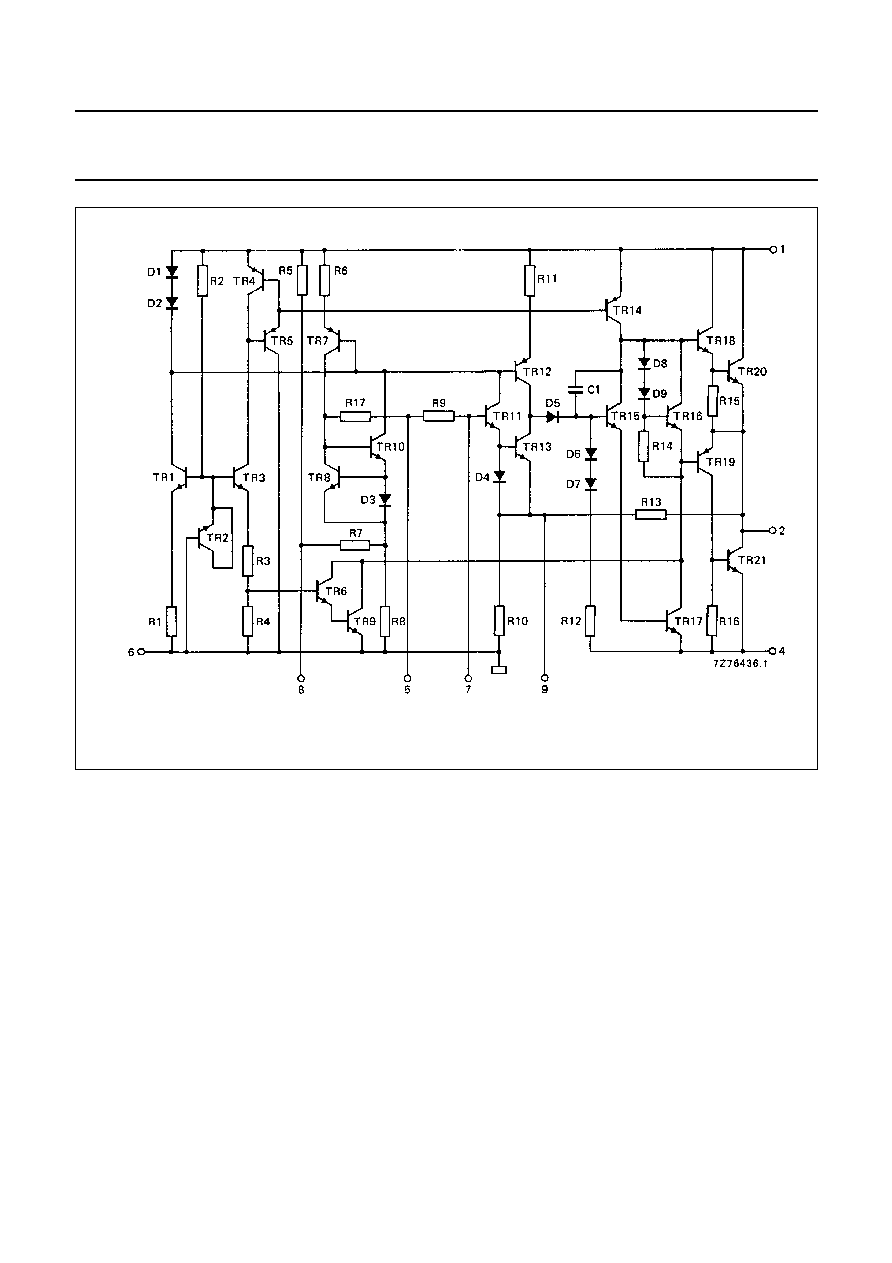
November 1982
3
Philips Semiconductors
Product specification
5 W audio power amplifier
TDA2611A
RATINGS
Limiting values in accordance with the Absolute Maximum System (IEC 134)
Supply voltage
V
P
max.
35 V
Non-repetitive peak output current
I
OSM
max.
3 A
Repetitive peak output current
I
ORM
max.
1,5 A
Total power dissipation
see derating curves Fig. 2
Storage temperature
T
stg
-
55 to
+
150
∞
C
Operating ambient temperature
T
amb
-
25 to
+
150
∞
C
Fig.1 Circuit diagram; pin 3 not connected.

November 1982
4
Philips Semiconductors
Product specification
5 W audio power amplifier
TDA2611A
Fig.2 Power derating curves.
HEATSINK EXAMPLE
Assume V
P
=
18 V; R
L
=
8
; T
amb
=
60
∞
C maximum; T
j
=
150
∞
C (max. for a 4 W application into an 8
load, the
maximum dissipation is about 2,2 W).
The thermal resistance from junction to ambient can be expressed as:
Since R
th j-tab
=
11 K/W and R
th tab-h
=
1 K/W, R
th h-a
=
41
-
(11
+
1)
=
29 K/W.
R
th j-a
R
th j-tab
R
th tab-h
R
th h-a
150
60
≠
2 2
,
----------------------
41 K/W.
=
=
+
+
=

November 1982
5
Philips Semiconductors
Product specification
5 W audio power amplifier
TDA2611A
D.C. CHARACTERISTICS
A.C. CHARACTERISTICS
T
amb
=
25
∞
C; V
P
=
18 V; R
L
=
8
; f
=
1 kHz unless otherwise specified; see also Fig. 3
Note
1. Input impedance can be increased by applying C and R between pins 5 and 9 (see also Figures 6 and 7).
Supply voltage range
V
P
6 to 35 V
Repetitive peak output current
I
ORM
<
1,5 A
Total quiescent current at V
P
=
18 V
I
tot
typ.
25 mA
A.F. output power at d
tot
=
10%
V
P
=
18 V; R
L
=
8
P
o
>
4 W
typ.
4,5 W
V
P
=
12 V; R
L
=
8
P
o
typ.
1,7 W
V
P
=
8,3 V; R
L
=
8
P
o
typ.
0,65 W
V
P
=
20 V; R
L
=
8
P
o
typ.
6 W
V
P
=
25 V; R
L
=
15
P
o
typ.
5 W
Total harmonic distortion at P
o
=
2 W
d
tot
typ.
0,3 %
<
1 %
Frequency response
>
15 kHz
Input impedance
|
Z
i
|
typ.
45 k
(1)
Noise output voltage at R
S
=
5 k
; B
=
60 Hz to 15 kHz
V
n
typ.
0,2 mV
<
0,5 mV
Sensitivity for P
o
=
2,5 W
V
i
typ.
55 mV
44 to 66 mV
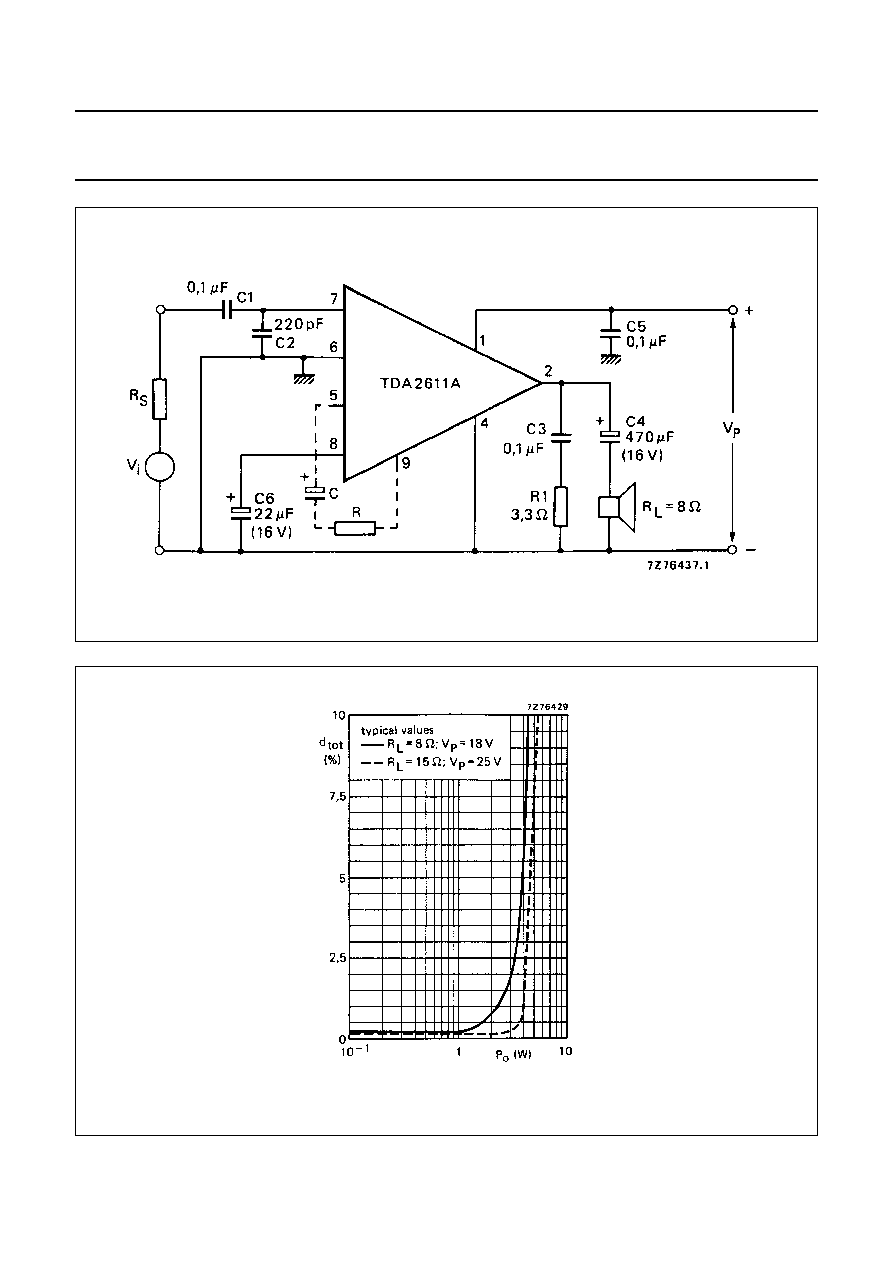
November 1982
6
Philips Semiconductors
Product specification
5 W audio power amplifier
TDA2611A
Fig.3 Test circuit; pin 3 not connected.
Fig.4 Total harmonic distortion as a function of output power.
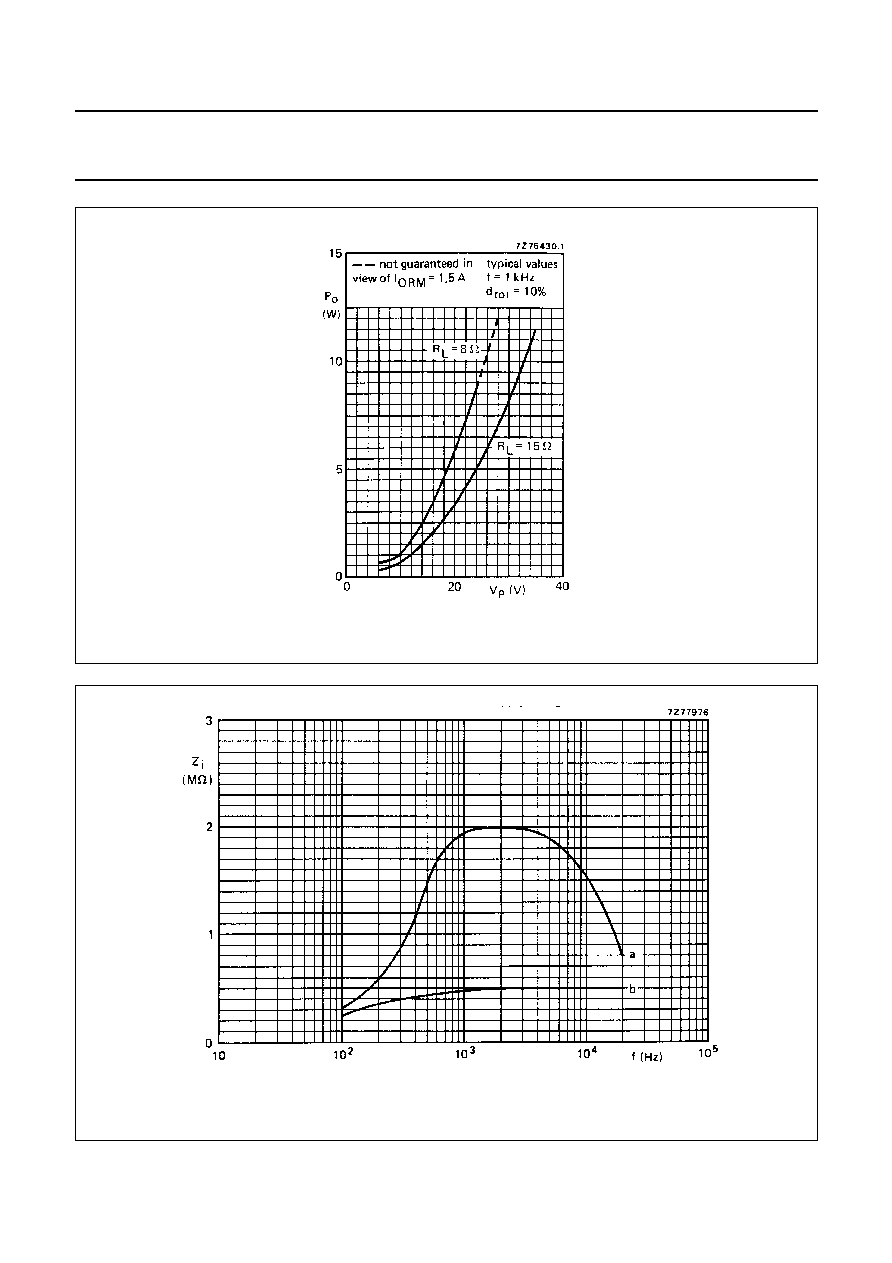
November 1982
7
Philips Semiconductors
Product specification
5 W audio power amplifier
TDA2611A
Fig.5 Output power as a function of supply voltage.
Fig.6
Input impedance as a function of frequency; curve a for C
=
1
µ
F, R
=
0
; curve b for
C
=
1
µ
F, R
=
1 k
; circuit of Fig. 3; C2
=
10 pF; typical values.

November 1982
8
Philips Semiconductors
Product specification
5 W audio power amplifier
TDA2611A
Fig.7 Input impedance as a function of R in circuit of Fig. 3; C
=
1
µ
F; f
=
1 kHz.
Fig.8 Total harmonic distortion as a function of R
S
in the circuit of Fig. 3; P
o
=
3,5 W; f
=
1 kHz.

November 1982
9
Philips Semiconductors
Product specification
5 W audio power amplifier
TDA2611A
Fig.9 Total power dissipation and efficiency as a function of output power.
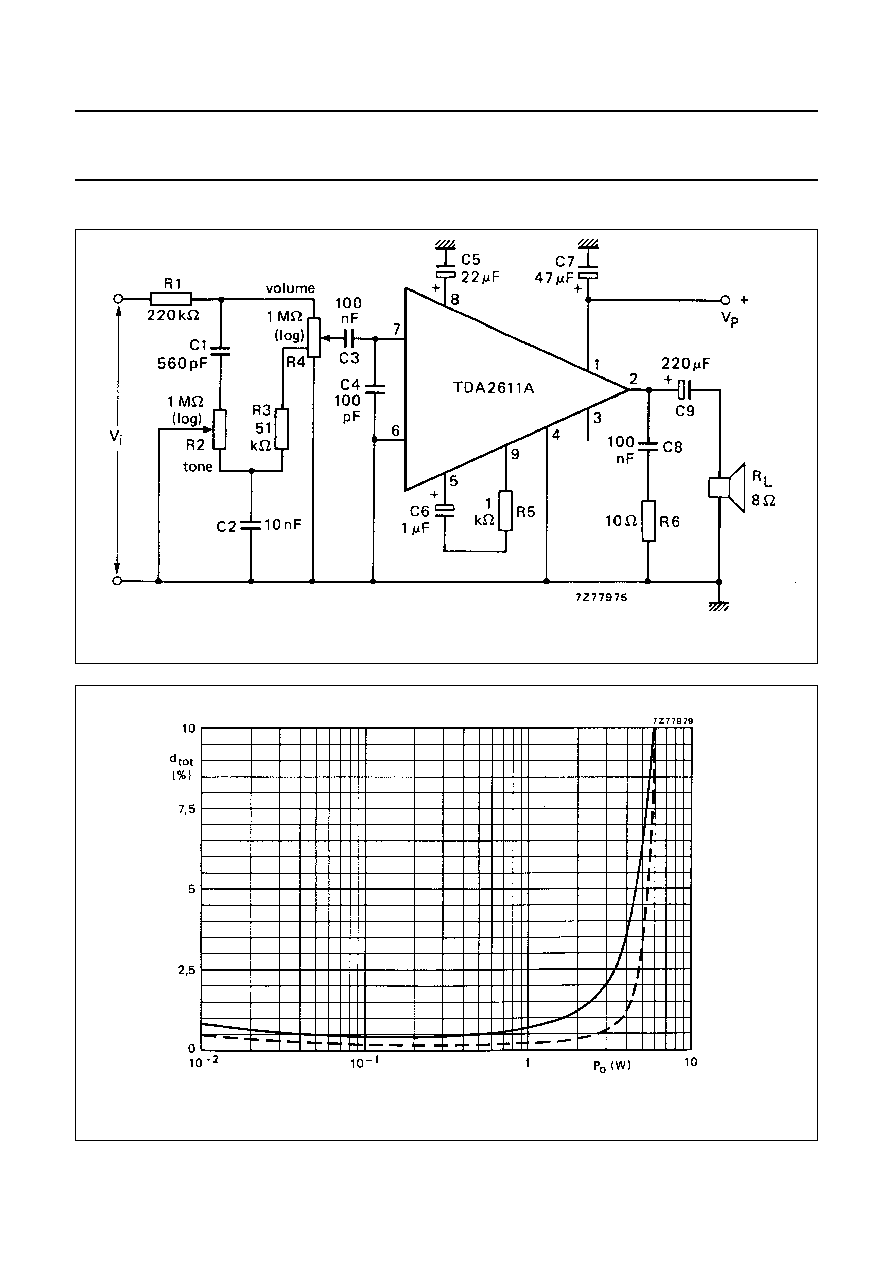
November 1982
10
Philips Semiconductors
Product specification
5 W audio power amplifier
TDA2611A
APPLICATION INFORMATION
Fig.10 Ceramic pickup amplifier circuit.
Fig.11 Total harmonic distortion as a function of output power;
with tone control;
- - -
without tone control; in circuit of Fig. 10; typical values.

November 1982
11
Philips Semiconductors
Product specification
5 W audio power amplifier
TDA2611A
Fig.12 Frequency characteristics of the circuit of Fig. 10;
tone control max. high;
- - -
tone control min. high; P
o
relative to 0 dB
=
3 W; typical values.
Fig.13 Frequency characteristic of the circuit of Fig. 10; volume control at the top; tone control max. high.
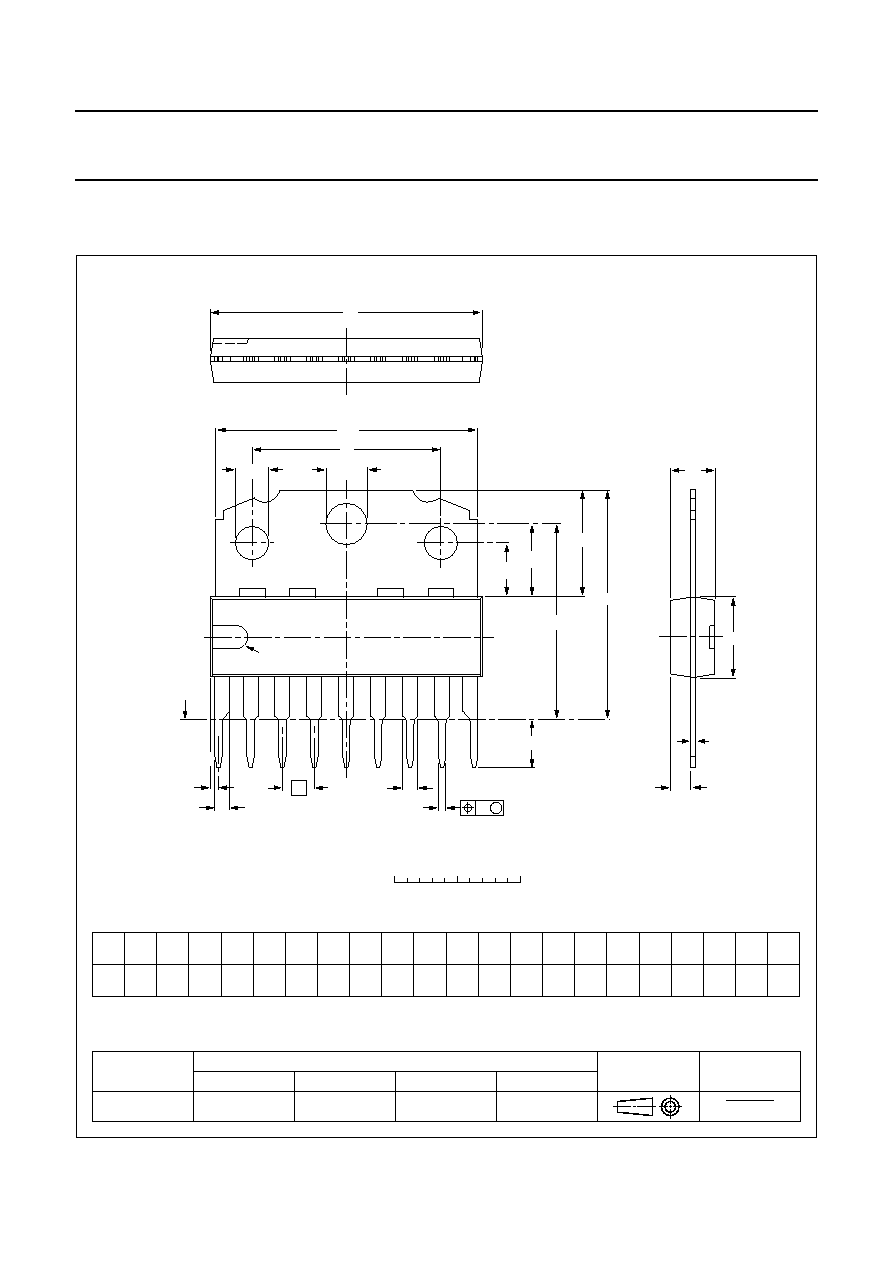
November 1982
12
Philips Semiconductors
Product specification
5 W audio power amplifier
TDA2611A
PACKAGE OUTLINE
UNIT
A
A
max.
2
A
3
b
1
D
1
b
2
b
c
D
(1)
E
(1)
Z
max.
(1)
e
L
P
P
1
q
1
q
2
q
REFERENCES
OUTLINE
VERSION
EUROPEAN
PROJECTION
ISSUE DATE
IEC
JEDEC
EIAJ
mm
18.5
17.8
3.7
8.7
8.0
A
4
15.8
15.4
1.40
1.14
0.67
0.50
1.40
1.14
0.48
0.38
21.8
21.4
21.4
20.7
6.48
6.20
3.4
3.2
2.54
1.0
5.9
5.7
4.4
4.2
3.9
3.4
15.1
14.9
Q
1.75
1.55
DIMENSIONS (mm are the original dimensions)
Note
1. Plastic or metal protrusions of 0.25 mm maximum per side are not included.
2.75
2.50
SOT110-1
92-11-17
95-02-25
0
5
10 mm
scale
0.25
w
D
E
A
A
c
A
2
3
A
4
q
1
q
2
L
Q
w
M
b
b
1
b
2
D
1
P
q
1
Z
e
1
9
P
seating plane
pin 1 index
SIL9MPF: plastic single in-line medium power package with fin; 9 leads
SOT110-1

November 1982
13
Philips Semiconductors
Product specification
5 W audio power amplifier
TDA2611A
SOLDERING
Introduction
There is no soldering method that is ideal for all IC
packages. Wave soldering is often preferred when
through-hole and surface mounted components are mixed
on one printed-circuit board. However, wave soldering is
not always suitable for surface mounted ICs, or for
printed-circuits with high population densities. In these
situations reflow soldering is often used.
This text gives a very brief insight to a complex technology.
A more in-depth account of soldering ICs can be found in
our
"IC Package Databook" (order code 9398 652 90011).
Soldering by dipping or by wave
The maximum permissible temperature of the solder is
260
∞
C; solder at this temperature must not be in contact
with the joint for more than 5 seconds. The total contact
time of successive solder waves must not exceed
5 seconds.
The device may be mounted up to the seating plane, but
the temperature of the plastic body must not exceed the
specified maximum storage temperature (T
stg max
). If the
printed-circuit board has been pre-heated, forced cooling
may be necessary immediately after soldering to keep the
temperature within the permissible limit.
Repairing soldered joints
Apply a low voltage soldering iron (less than 24 V) to the
lead(s) of the package, below the seating plane or not
more than 2 mm above it. If the temperature of the
soldering iron bit is less than 300
∞
C it may remain in
contact for up to 10 seconds. If the bit temperature is
between 300 and 400
∞
C, contact may be up to 5 seconds.
DEFINITIONS
LIFE SUPPORT APPLICATIONS
These products are not designed for use in life support appliances, devices, or systems where malfunction of these
products can reasonably be expected to result in personal injury. Philips customers using or selling these products for
use in such applications do so at their own risk and agree to fully indemnify Philips for any damages resulting from such
improper use or sale.
Data sheet status
Objective specification
This data sheet contains target or goal specifications for product development.
Preliminary specification
This data sheet contains preliminary data; supplementary data may be published later.
Product specification
This data sheet contains final product specifications.
Limiting values
Limiting values given are in accordance with the Absolute Maximum Rating System (IEC 134). Stress above one or
more of the limiting values may cause permanent damage to the device. These are stress ratings only and operation
of the device at these or at any other conditions above those given in the Characteristics sections of the specification
is not implied. Exposure to limiting values for extended periods may affect device reliability.
Application information
Where application information is given, it is advisory and does not form part of the specification.












